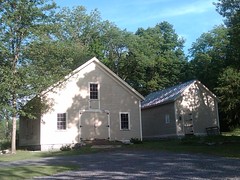My fixer-upper forays with Bruce Ware and other local realtors evolved when Susan joined the search. She shared my dream of an old farmhouse surrounded by open meadows with views and sunlight. She liked barns and was even receptive to my occasional flights of fancy about converting an old barn into a home.
But our notions of size and simplicity were less aligned. And Susan was particularly keen on finding a Lake Champlain waterfront property. “What’s the point of having a place that’s not on the lake?” she asked repeatedly as if the answer were self evident.
The odds of finding an old farm on Lake Champlain (bygone barns “In Old Champlain“) were slim enough, but the prospect of finding a simple, inexpensive property on the lake was totally implausible unless we shifted our thinking toward seasonal camps. South of Westport and north of Essex there were many small properties tucked along the lakeshore that Bruce insisted on showing us despite repeatedly explaining that they were not what we had in mind.
We also looked at inland farms and interesting old homes in small towns and hamlets, “Just so you can see what’s out there…”
We enjoyed looking and brainstorming, but we were growing frustrated with the increasingly diffuse range of properties we were seeing. We had lost our focus.
Bruce was trying to show us all of the options available which in equal turns dilated and frustrated our search. But there was an even more fundamental problem: Susan and my interests were not perfectly aligned.
Although a farm on the lake (especially an old barn that could be reimagined as a home) was proving an impossible ambition, our imaginations were piqued on several occasions by totally dissimilar and totally unlikely properties.
An old “Great Camps” style summer house in Westport overlooking Lake Champlain’s Northwest Bay intrigued me until I realized that this pedigreed manse adjoined — indeed partially overlooked — the town’s sewage treatment plant.
A handsome slate roofed barn, still square after a century or more standing at the crest of an immense field just south of Westport, beguiled me for a while. I imagined a lofty open plan; exposed, rough hewn beams; magnificent views in all directions. But the seller was unable or unwilling to subdivide the field and barn from a much larger farm which included additional fields, an immense dairy barn, various other building for hay and equipment storage, a “pond” for storing cow manure and a large square farmhouse with cupola. And in the end it was a relief to Susan, because, after all, this magnificent barn did not stand on the shores of Lake Champlain.
And then there was Rosslyn, a Merchant-Ivory film set for The Great Gatsby’s Adirondack prequel. A century earlier. Located on the lake in Essex, it included a boathouse I’d loved since I was a child, a carriage barn, an ice house, and plenty of stone walls. But there were no fields and too many buildings. And the house was too big. And too run down. Way too run down. And the price tag was beyond unrealistic.
During our first visit Susan and I had both known immediately, instinctively, conclusively that Rosslyn was not for us. Purchasing this once stately but now desperately dilapidated property was a bad idea. A really, really bad idea.
The expense alone. There was no conceivable short term return on investment. None.
And the amount of time it’d take to understand all of the property’s problems, let alone begin to fix them, to build her back to her former glory? It was incomprehensible.
But money, scope, logistics, that was just the tip of the iceberg. Long deferred maintenance, decades overdue; a gutted rear wing with failing floors suspended from cables that stretched through the middle of rooms; crumbling foundations; faulty electric, plumbing and heating; a boathouse that was one ice flow away from a watery grave; an ice house with corn cribbing walls and a collapsed roof. The current owner had dedicated the better part of four decades of his life, four decades — full time — to renovating Rosslyn and yet it was disintegrating around him.
Buying Rosslyn was totally incompatible with our means, our lives and our plans. And yet Rosslyn seduced us. Susan and I visited and then, months later, revisited the property, each time musing about its potential despite knowing that we shouldn’t, couldn’t, wouldn’t ever own it.
Our increasingly unfocused search — Susan and my notions of the perfect fixer-upper diverging and converging unpredictably — must have vexed Bruce despite his perennial good humor and patience. Though we did periodically visit additional properties when Bruce called with new listings that he thought might appeal to us, our enthusiasm for discovering the perfect spot gradually waned. And our enthusiasm for Rosslyn, for brainstorming and daydreaming and scheming some way to transport this once stately property into our new home, gained momentum.

Leave a Reply